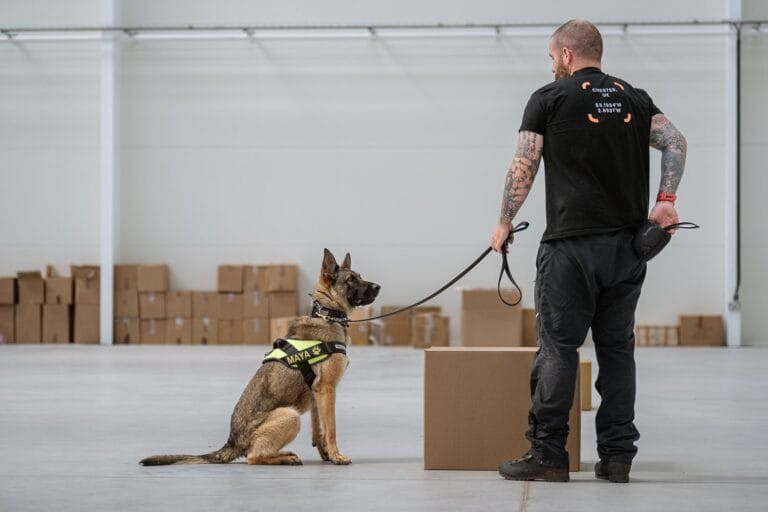As threats evolve—be it the rise of lithium batteries posing fire hazards or emerging smuggling tactics—screening methods must advance rapidly to keep pace. The integration of highly trained canine teams and cutting-edge technology is revolutionising how cargo is inspected for safety and security, ensuring efficiency without compromising thoroughness.
When Global K9 Protection Group (GK9PG) first received TSA approval to provide certified canine services for cargo screening, the focus was heavily on training the dogs and their handlers. Daniels explains that the operation has since grown more sophisticated, with an expanded emphasis on understanding the cargo processes themselves.
“Initially, the focus was very much on canine handling operations, and that’s kind of evolved to where we have to train cargo operations as well,” Chris Daniels, Chief Strategy Officer at GK9PG, says. “When they’re working in the operational environment, understanding how the client moves things is just as critical.”
This shift reflects the complexity of working across multiple clients and cargo environments. Daniels highlights that their handlers must adapt to varying processes, since “one company, one process” is rarely the case in logistics. The approach allows GK9PG to serve multiple smaller operators efficiently, offering a shared resource model that maximises flexibility—“where the smaller operators still have access to the capability, but they only need four hours on Tuesday and Wednesday.”
The evolving nature of cargo itself also influences how screening is conducted. With fluctuations in e-commerce volumes and changes in commodity flows, particularly hazardous goods, canine teams must be ready to detect a broad range of threats. Daniels notes, “As the providers change their processes to meet what they see as the threat, we see now lithium battery, you know, it’s obviously an issue. We’ve seen that the origin countries will crack down.”
Real-time screening
While canine teams remain a core strength, Daniels points out the crucial role technology plays in transforming cargo screening efficiency and effectiveness. Early innovations focused on streamlining operations and reducing paperwork burdens:
“There was a lot of hand-written paper being passed back and forth, which really slowed down our operation. So that was kind of the root of the solution.”
Now, with digital tools capturing video and other data during screenings, GK9PG is able to provide clients with real-time insights. “We’re capturing this video—what else can we do with it? How can we improve the process, not just for us but also for the client?” Daniels explains.
This approach ties into other innovations like iotas one record—a system that tracks cargo shipments digitally—allowing data from canine screening to seamlessly integrate into broader supply chain security records. “The client having information through our systems, as well as their own, is critical for us to move forward. Because technology is going to continuously innovate, we had to develop something that was very open to future innovation.”
This openness ensures that the company can keep pace with technological advancements, providing a more transparent, responsive, and data-driven security solution.
Elite expertise
The portfolio of detection capabilities has broadened significantly beyond traditional canine screening. Daniels describes their service as “elite detection,” combining the most effective tools available, from physical searches to X-rays and Explosive Trace Detection (ETD) machines.
“The products that come through… that’s using all the available and approved methods you have,” he says. This integrated approach reduces client costs and complexity, allowing a single provider to deliver multiple layers of screening efficiently.
Training is also tailored by cargo type and location, enabling the team to “enhance our training and be able to deliver for that,” Daniels adds. This flexibility helps meet unique client needs without requiring multiple providers or excessive staffing.




